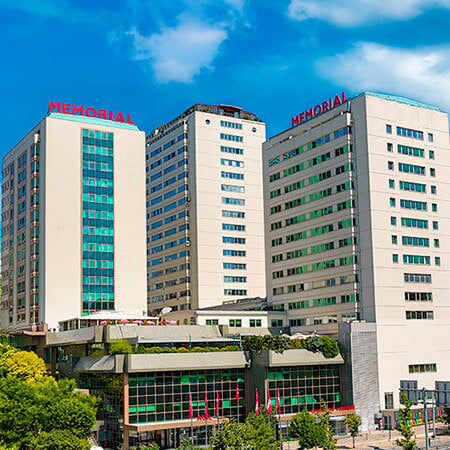Aplastic anemia (Anemotrophy)
Due to the difficulties associated with the organization of treatment in Turkey, Switzerland, South Korea and India, we are not currently processing requests to these regions.
If you are interested in treatment in Germany, please leave a request and our specialists will contact you as soon as possible.
Aplastic anemia is characterized by the oppressed process of blood corpuscle production (leukocytes, platelets, erythrocytes) in the bone marrow. This is a rare pathology. Its incidence in Western countries is 3-5 cases per million of population a year. Asia has the highest incidence which is up to 15 cases per million of population a year.
The Booking Health portal presents 52 German clinics specializing in aplastic anemia (anemotrophy) treatment
Show all clinics
Aplastic anemia – Diagnostics
Aplastic anemia is diagnosed on the basis of blood test and a biopsy of the ilium. Yellow bone marrow prevails over red one in trepanobioptate.
Diagnosis criteria which are determined while performing a blood test, are the following:
- Normocytic anemia (erythrocytes size stays within the normal range while their overall quantity is decreased)
- MCV ranges from 80 to 100 (it’s an indicator that is received by division of hematocrit on the erythrocytes quantity)
- Hypoplastic anemia (reticulocytes are below 1%)
- Granulocytopenia (reduction of granulocytes, one of the leukocytes types, in the blood)
- Thrombocytopenia (low level of platelets in the blood)
According to clinical course there are:
- Aplastic anemia
- Severe aplastic anemia
- Super severe aplastic anemia
Criteria for diagnosis of severe aplastic anemia are:
- Level of polymorphonucleocytes in the peripheral blood is lower than 0,5x109/l
- Level of reticulocytes is below 20x109/l
- Platelet concentration is below 20x109/l
- Hypocellular bone marrow (according to the biopsy results)
Super severe aplastic anemia is diagnosed when polymorphonucleocytes level in the peripheral blood drops below 0,2x109/l.
Best clinics for the aplastic anemia diagnostics in Germany:
Aplastic anemia – Treatment
The main purpose of the treatment is to reach remission period of aplastic anemia. In some patients, this can be achieved with the help of immunosuppressive therapy.
Other patients can be treated only with the help of stem cells transplantation. The second aim of the treatment is to normalize blood indicators to block the symptoms of the disease.
Main directions in aplastic anemia treatment are:
- Immunosuppressive therapy. Doctors prescribe such drugs as cyclosporin A, cytostatics, anti-thymocyte immunoglobulin. Some patients undergo the surgical removal of the spleen. Immunosuppressive therapy is ineffective in patients with severe and super severe aplastic anemia.
- Symptomatic treatment is aimed at the compensation of hematopoietic insufficiency and elimination of the consequences of illness. A patient has to undergo the intravenous infusion of erythrocyte mass and platelet for blocking of anemic and hemorrhagic syndrome. Antibacterial treatment is performed if there is an infectious process in the body.
- Stem cells transplantation is the only way of aplastic anemia treatment that allows to reach a permanent clinical improvement. Stem cells are taken from a donor. Doctors take them either from donor’s bone marrow or from the peripheral blood. After that, in case of success, there comes a stable remission of the disease.
Best clinics for the aplastic anemia treatment in Germany:


Memorial Sisli Hospital Istanbul
116443.39101443.39
Aplastic anemia – Rehabilitation
The most modern rehabilitation programs are used in Germany. They are adapted individually for each patient, and are based on the recent disease, age, physical possibilities, and the results of treatment. Different specialists such as: therapists, hematologists, psychologists are involved in the rehabilitation process. The purpose of rehabilitation in the case of aplastic anemia is to achieve a stable remission of the disease and improve the overall health condition of the patient.
The rehabilitation includes necessary drug support and transfusion therapy (injection of the lacking blood cells into the body). Also, it is necessary to hold a consultation with the patient about the proper nutrition and the way of life which is important for him in the current situation.
Rehabilitation programs in Germany are designed for 2 weeks. If necessary, they can last much longer. In this country, the patient is provided with qualitative care, accommodation in comfortable rooms and individually selected meals.
Rehabilitation programs in Germany show one of the best results in the world. Most patients successfully restore their employability and excellent health there. They remain physically active, return to the full social and family life.
Best clinics for general therapeutic rehabilitation in Germany:
Author:
The article was edited by medical expert, board certified Dr. Nadezhda Ivanisova. For the treatment of the conditions referred to in the article you must consult a doctor; the information in the article is not intended for self-medication!
Source:
NORD - National Organization for Rare Disorders
The cost of services includes
Here you can find the cost of treatment for this disease at the German University Hospitals. Leave a request and we will provide a free consultation with a doctor and will start organizing the whole treatment process.
The program includes the following:
- Issuing of an invitation for getting a visa for treatment as quick as possible
- Fixing an appointment at a time convenient for you
- Preliminary organization of a comprehensive examination and discussion of the forthcoming treatment plan
- Arranging transfer from the airport to the hospital and back to the airport
- Provision of interpreting services and services of a personal medical coordinator
- If necessary, assistance in the organization of further surgical treatment
- Provision of a medical insurance against treatment complications covering up to 200,000 euro
- Preparation and translation of medical records and recommendations from the hospital
- Assistance in the subsequent communication with your attending physician, including consultations on repeated X-ray images through the unique medical document management system E-doc




